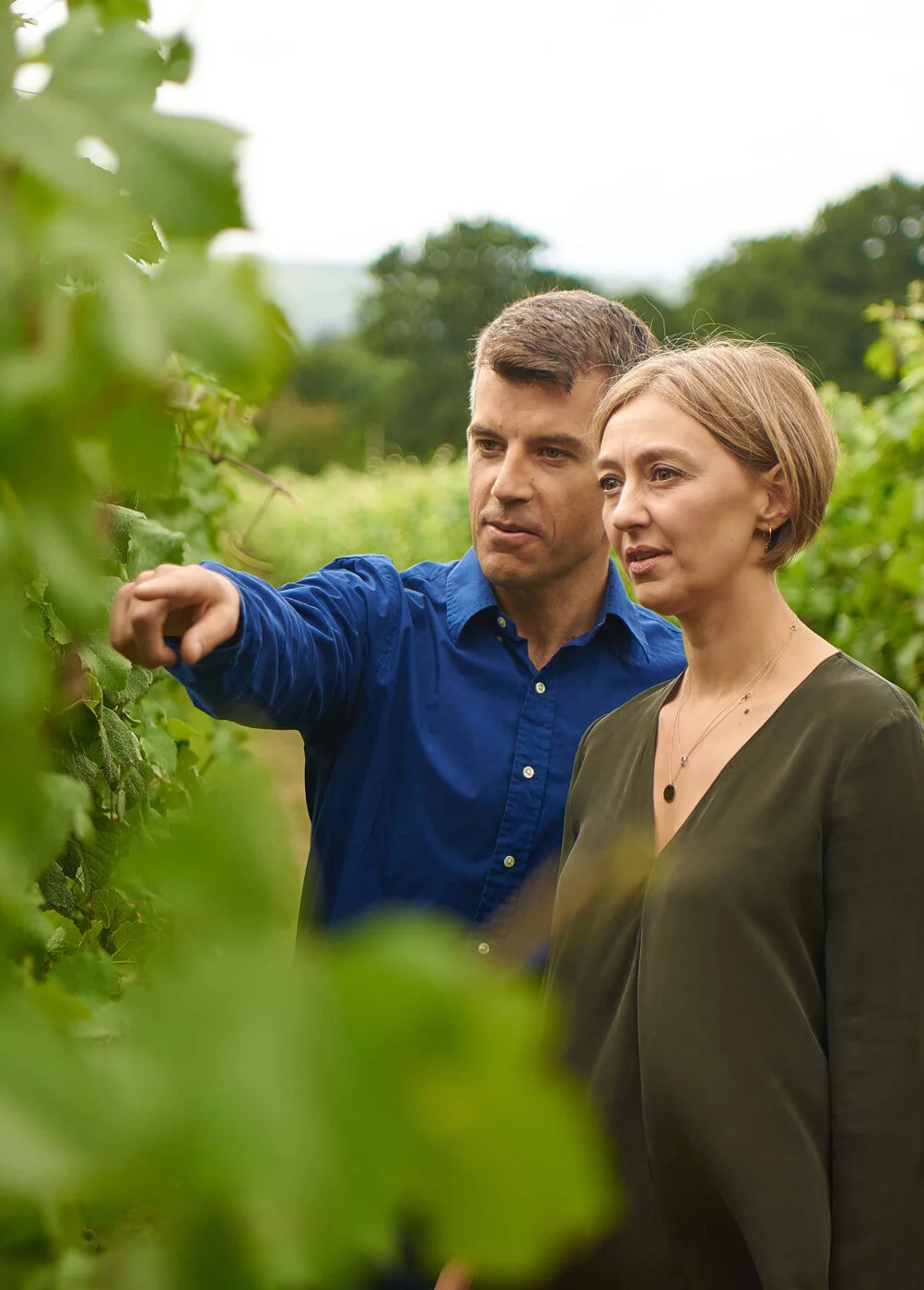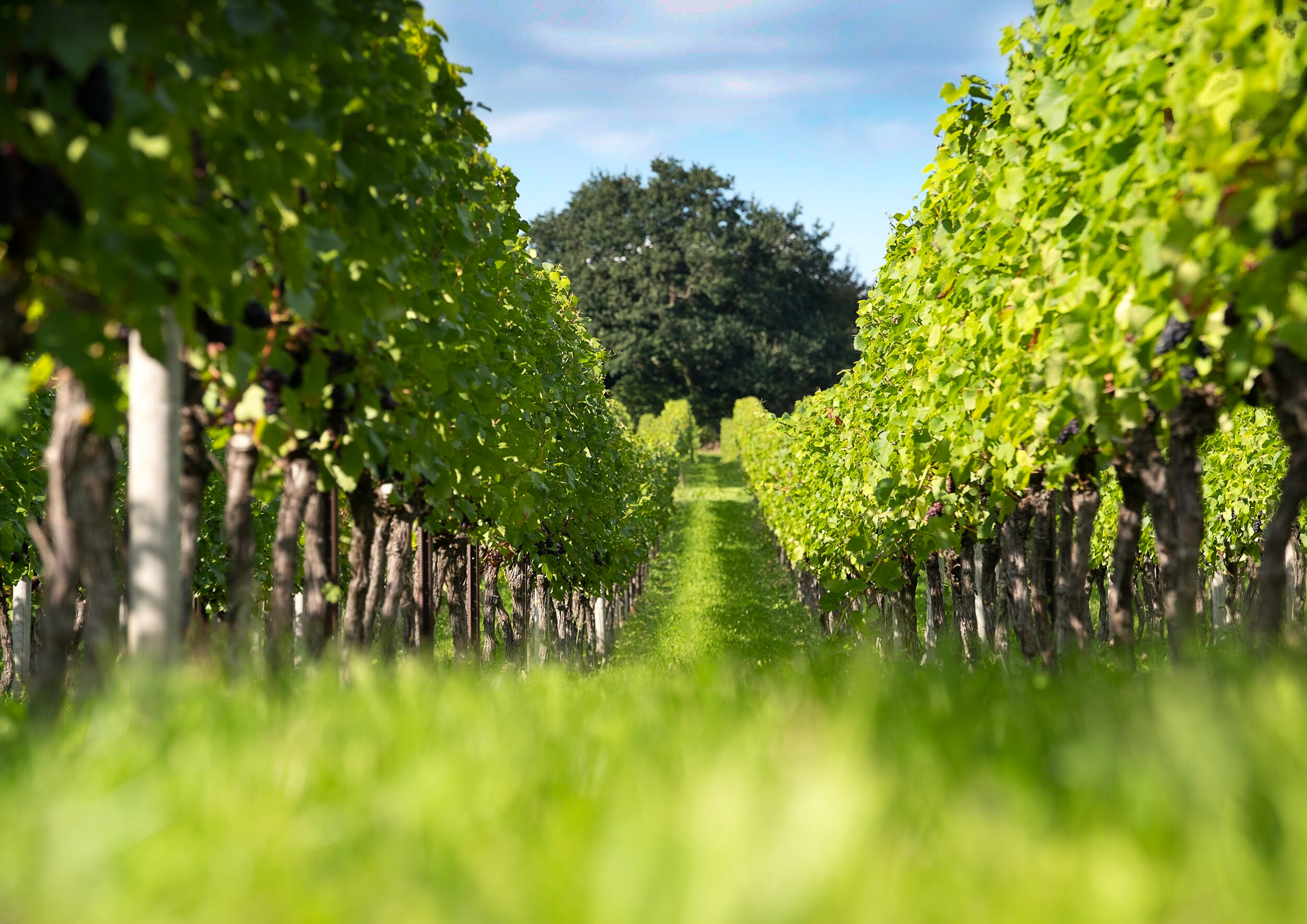Spill the Grapes ~ Nyetimber’s Brad Greatrix
GLOBAL STORIES
Nyetimber, English Sparkling Wines, has long been a favourite among our guests - they are given a welcome glass on arrival to Thyme - and it pairs nicely with many of our light summer dishes in the Ox Barn. The quintessentially British brand shares our ethos for conservation and appreciation for the land. Winemaker, Brad Greatrix, spills the grapes on the art of English sparkling winemaking.
Nyetimber is now praised as one of the finest English wines. What have you discovered about the English countryside that cultivates good grapes?
In certain parts of the South of England, we are blessed with the ideal soil types - greensand and chalk - for our particular vine varieties (Chardonnay, Pinot Noir, Pinot Meunier). These have generic qualities that are known to be perfect for cultivating sparkling wine grapes. Further to this, our vineyard sites are very carefully selected and are specific to our local landscape – south facing slopes for maximum sun exposure, combined with the sheltering effect of the South Downs. Both of these characteristics promote the gentle ripening of our grapes.
Going back to the roots, how does the local climate characterise the quality and taste of the wine?
The benefit of our cooler climate is that it results in a long growing season (sometimes up to 4 weeks longer than Champagne) which allows for a slow, delicate accumulation of flavours in the grapes. In the context of sparkling wine production, it is essential to retain a relatively high acidity for the base wines – this is something we embrace and, subsequently, our wines are characterised by their vibrancy and finesse.
How does conservation play a part in Nyetimber’s philosophy?
Conservation is so important to us because our local environment ultimately shapes the wines we produce.
Over one third of the total Nyetimber estate is natural ‘non-productive’ hedgerows, windbreaks, woods, garden, ponds and meadow. Nyetimber’s vines are surrounded by natural habitats including native broadleaved woodlands which are managed and replanted, as well as wildflower meadows that provide food and nesting places for birds and insects. The estate creates wildlife corridors that give larger fauna passage across the land. The mowing schedule for the cover crops between the rows of vines is fauna-friendly and sheep are used to crop the grass as an alternative to tractor-pulled mowers in winter; their droppings make a small but worthwhile contribution to the soil’s nutrients and the reduction in tractor use helps to minimise soil compaction.
Can you share a little about how this mindful approach is incorporated in the production process?
From vine all the way through to bottle, we are conscious of our impact on the land and we employ the philosophy of ‘minimal intervention’ wherever possible.
Our Pressing Centre in West Chiltington is reached via the estate’s own tracks, reducing road mileage. The building generates some of its own power through PV (photovoltaic) cells and rainwater is harvested and recycled for use in some of the building services. Our Nyetimber glass bottles weigh 835g, compared with the industry standard of 905g. This results in a significant 10% saving in the number of journeys, fuel consumption and emissions.
It’s a sunny summers day, which wine would you reach for and how would you enjoy it?
Nyetimber Rosé – evocative of an English summer in a glass! Fresh red fruits, sweet spice and freshly baked pastry… It is perfect as an aperitif or great with slightly weightier dishes such as salmon fillets, tuna steak or poultry.
While wine is often a catalyst for social occasions, how have you seen the previous year in lockdown affect the perception and appreciation of wine?
With lockdown came the inevitable closure of the hospitality sector and therefore many of our wonderful restaurant and hotel accounts. However, we have seen a considerable surge in online orders, with many people now seemingly opting to enjoy more premium wines at home. There has also been a noticeable increase in the consumer’s desire to learn about the wines they are drinking. We hosted numerous virtual wine tastings over the course of lockdown and have noticed how customers are paying greater attention to the winemaking and provenance side of Nyetimber’s wines, not simply the taste.
What snippet of advice could you share with a budding winemaker?
To travel and taste as many wines as possible (covid allowing). Go and visit different areas, the varied locations and landscapes of vineyards, talk directly to people who make the wines and ask questions. This was vital to both mine and Cherie Spriggs’, our Head Winemaker, development and ability to be where we are now. Final tip - note it all down! I still have my notebook from every visit to a vineyard and work I experienced and to this day still reference notes I wrote down.
The Nyetimber bus will be in situ in front of the Tithe Barn from 23rd June over English Wine Week, and a glass of Nyetimber rosé will accompany our special summer set menu in celebration of Meadow Season. Join us! Book your table at the Ox Barn, here.





